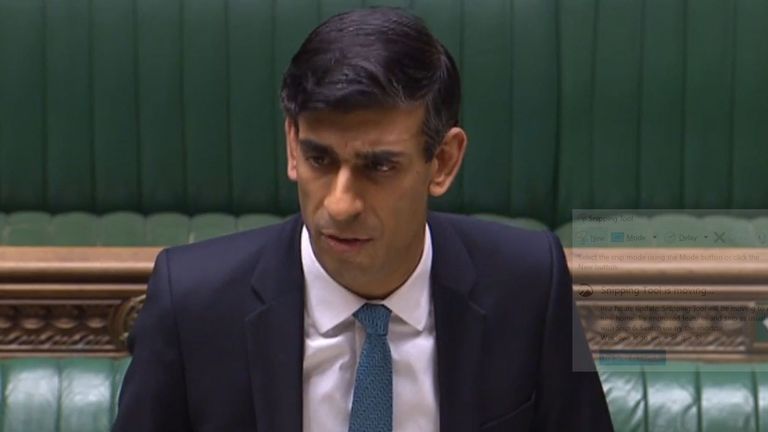More than one in five British workers have now been furloughed, meaning the government is paying the wages of 6.3 million people.
Under the job retention scheme, 80% of an employee's wages are paid by the state - up to a maximum of £2,500 a month.
Downing Street says the initiative has cost £8bn so far, with 800,000 employers affected by the coronavirus pandemic making a claim through HM Revenue and Customs.
The scheme is designed to save companies from having to lay off their staff permanently even as business grinds to a halt because of COVID-19.
It opened for claims on 20 April.
The prime minister's official spokesman said: "Since the launch, 800,000 employers have used the job retention scheme to furlough 6.3 million jobs.
"That's to a total value of £8bn."
The scheme was originally set to cover the wages of temporarily laid-off staff until the end of May, but was later extended by a month.
It has been taken up by big companies including British Airways, which announced that it would use it to subsidise the income of more than 30,000 employees.
Torsten Bell, chief executive of think-tank the Resolution Foundation, said the latest figures showed "in stark terms the scale of the economic shutdown that Britain is living through".
"If this kind of volume of workers stay on the scheme for several months the cost will run into the tens of billions of pounds," Mr Bell said. "And that is a cost very much worth paying."
The latest figures on the furlough scheme come as the government begins the rollout of its Bounce Back scheme to support small businesses.
The programme of 100% state-backed loans for smaller firms is designed to be less complicated than other support initiatives set up during the pandemic.
Chancellor Rishi Sunak has said the government will do "whatever it takes" to help afflicted households and companies through the crisis, pledging more than £300bn in loan guarantees to stricken businesses.
But there has been criticism that its main coronavirus business interruption loans scheme (CBILS) has been too slow to get money out to the companies that need it.
Banks, which are handling the applications, say they have been hampered by the fact that CBILS loans are only 80% backed by the taxpayer - unlike similar schemes in Germany and Switzerland, which enjoy a 100% state guarantee.
https://news.google.com/__i/rss/rd/articles/CBMiZ2h0dHBzOi8vbmV3cy5za3kuY29tL3N0b3J5L2Nvcm9uYXZpcnVzLWZ1cmxvdWdoLXNjaGVtZS1ub3ctcGF5aW5nLTYtM20td29ya2Vycy1zYXlzLWdvdmVybm1lbnQtMTE5ODMwNjDSAWtodHRwczovL25ld3Muc2t5LmNvbS9zdG9yeS9hbXAvY29yb25hdmlydXMtZnVybG91Z2gtc2NoZW1lLW5vdy1wYXlpbmctNi0zbS13b3JrZXJzLXNheXMtZ292ZXJubWVudC0xMTk4MzA2MA?oc=5
2020-05-04 16:43:58Z
CBMiZ2h0dHBzOi8vbmV3cy5za3kuY29tL3N0b3J5L2Nvcm9uYXZpcnVzLWZ1cmxvdWdoLXNjaGVtZS1ub3ctcGF5aW5nLTYtM20td29ya2Vycy1zYXlzLWdvdmVybm1lbnQtMTE5ODMwNjDSAWtodHRwczovL25ld3Muc2t5LmNvbS9zdG9yeS9hbXAvY29yb25hdmlydXMtZnVybG91Z2gtc2NoZW1lLW5vdy1wYXlpbmctNi0zbS13b3JrZXJzLXNheXMtZ292ZXJubWVudC0xMTk4MzA2MA



Tidak ada komentar:
Posting Komentar